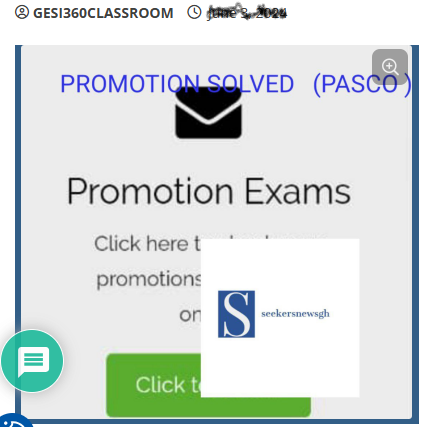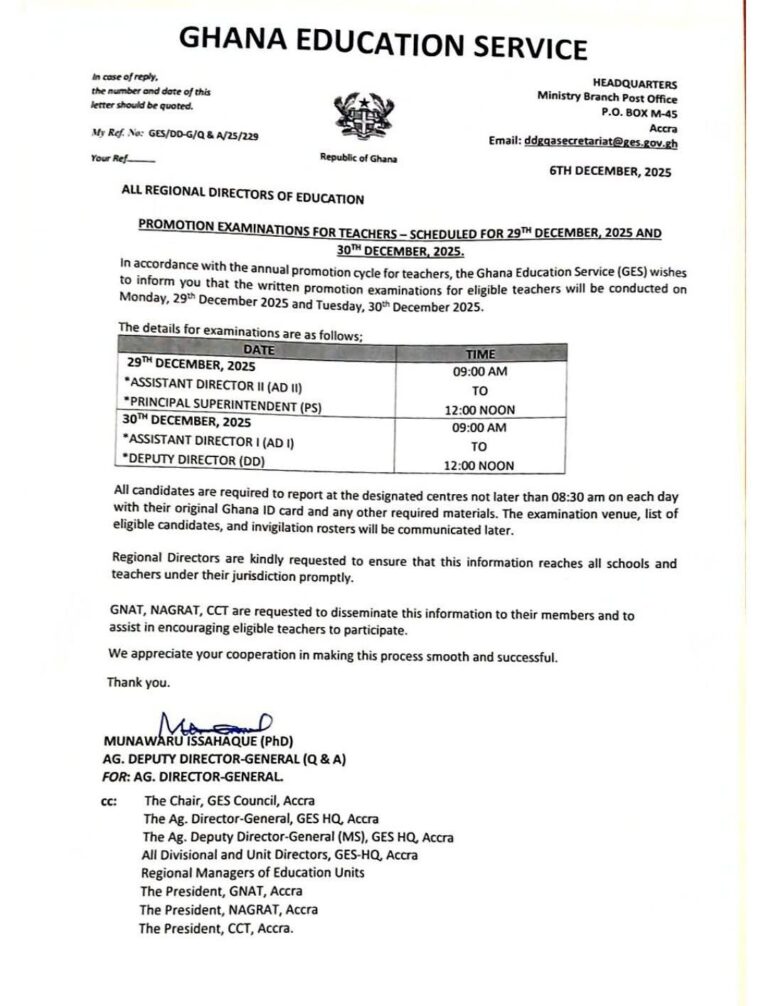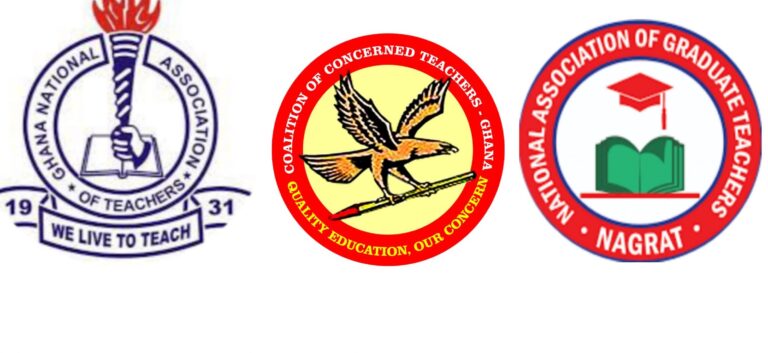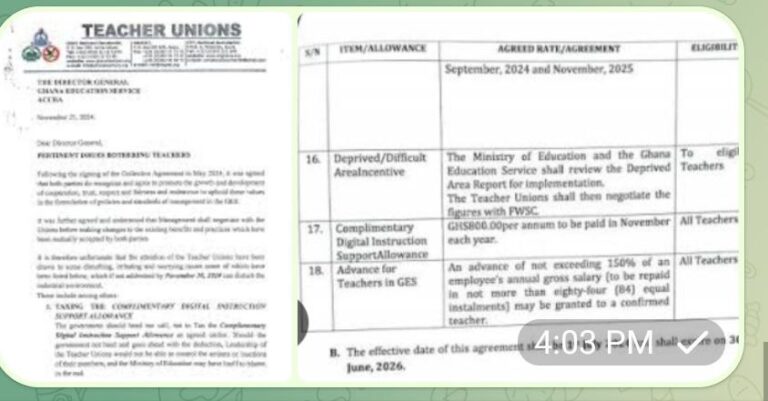
SECTION A: MULTIPLE CHOICE QUESTIONS
-
The Common Core Programme (CCP) for Junior and Senior High Schools consist of how many subjects?
A. 7
B. 8
C. 9
D. 10
Answer: C -
Which one of these agencies is not a body under the Ministry of Education which Implements its policies and programmes related to education?
A. Complementary Education Agency
B. Ghana Library Board
C. Ghana Tertiary Education Commission
D. National Commission for Civic Education
Answer: D -
Which of the following is/are the objectives of the 1987 Education Reform?
I. Increase access to basic education
II. Shorten the pre-university education structure from 17 years to 12 years
III. Make education cost effective
IV. Improve quality of education by making it more effective to socio-economic conditions
A. I only
B. I, II and IV
C. I, II, III and IV
D. III only
Answer: C -
Which of the following was part of the programmes and interventions implemented to facilitate the attainment of the Free Compulsory Universal Basic Education (FCUBE) policy objectives?
I. Quality Improvement in Primary Schools (QUIPS)
II. Child School Community Progress in Education (Child Scope)
III. Performance Monitoring Test (PMT)
IV. District Teacher Support Team (DTST)
A. I, II and III only
B. I, II, III and IV
C. II and III only
D. III only
Answer: B -
Ghana’s system of education is aimed at which of these aspects of development?
A. Character formation
B. Personality development
C. Preservation of culture
D. All of the above
Answer: D -
The Ghana Education Service was established by the Ghana Education Service Act 1995,
A. Act 506
B. Act 778
C. Act 788
Answer: A -
Which of the following is/are not the way through which education policies are formulated?
I. Imposition by elites
II. Political discussions
III. Stakeholder consultations
A. I only
B. I, II and III
C. II only
D. III only
Answer: A -
Which of the following subjects is not part of the list of subjects to be studied under the Common Core Programme for Junior and Senior High Schools in Ghana?
A. Career Technology
B. History
C. Physical and Health Education
D. Religious and Moral Education
Answer: B -
The current Deputy Director-General of the Ghana Education Service in charge of Quality and Access is known as
A. Dr. Kwabena Bempah Tandoh
B. Lawyer Anthony Boateng
C. Professor Kwasi Opoku-Amankwah
D. Professor Matthew Opoku Prempeh
Answer: A -
Membership of the Ghana Education Service is made up of all the following except
A. All the stakeholders in education
B. Other persons that may be employed for the service
C. Teachers and non-teaching supporting personnel in pre-tertiary educational institutions in the public system
D. The personnel of the Ghana Education Service existing immediately before the coming into force of the Ghana Education Act of 1995
Answer: A -
Which of the following is least remedy for students’ absenteeism in schools?
A. Parents should be counseled to ensure regular attendance of their wards/pupils to school
B. Parents should personally supervise the activities of their wards to ensure that they do not play truancy
C. Pupils should be punished for absenteeism
D. Teachers should desist from harassing students
Answer: C -
The headteacher in a learner-centered school undertakes all following activities to enhance teaching and learning except
A. Empowering in the teaching/learning process
B. Encouraging teachers to avoid tests and other assessment because they demoralize students
C. Encouraging teachers to develop lesson plans that use existing knowledge to construct new knowledge
D. Motivating and sustaining teachers’ interest in teaching
Answer: B -
Which one of the following is the most common role of teachers in education?
A. Build a warm environment in the classroom
B. Mentor and nurture students
C. Provide leadership for learning
D. Set the tone of their classrooms
Answer: B -
Which of the following is not one of the core competencies emphasized in the new standards-based curriculum?
A. Clarity
B. Collaboration
C. Communication
D. Critical thinking
Answer: A -
Which of the following methods, techniques and principles are teachers encouraged to use to promote effective teaching and learning?
I. Building on past learning or previous knowledge and positive reinforcement
II. Providing guidance and practice in class before independence practice
III. Motivating and sustaining pupils’ interest
IV. Involving each learner in the teaching and learning process
V. Even distribution of evaluative questions
A. I, II and III only
B. I, II, III, IV and V
C. I, II, III and IV only
D. II and III only
Answer: B -
Supervision of teaching mainly ensures
A. Achievement of success in examination
B. Advancement of pupil welfare
C. Proper utilization of school facilities
D. Quality delivery of the curriculum
Answer: D -
Management is commonly defined as
A. Getting things done so that demand is fulfilled
B. Getting things done through other people
C. Knowing what actually has been produced and which should have been produce
D. Working for others
Answer: B -
Rote learning is more common with …………….. curriculum.
A. Learner-centered
B. Problem-based
C. Standard-centered
D. Subject-centered
Answer: D -
All the following statements about the teacher are correct, except that the teacher
A. Impose ideas on pupils
B. Is seen as role model to pupils
C. Is the leader of the class
D. Serves as a facilitator to pupils’ teaching
Answer: A -
Teaching objectives should be all the following, except being
A. Achievable
B. Realistic
C. Rigid
D. Time-bound
Answer: C -
The maturity of students determines the
A. Appropriate motivational techniques needed to be employed
B. Learning tasks
C. Teaching methods
D. All of the above
Answer: D -
Which one of the following reasons best explains why teachers should ensure that there are physical pathways for students in the classroom? The pathways
A. Allows students private space to work for themselves
B. Make it easier for teachers to attend to individual students needs
C. Make it easier for teachers to see the board from the back
D. Make students less likely to become distracted
Answer: B -
If teachers want to present information to students in interesting ways, they should start from what they
A. Already know
B. Are to know
C. Are willing to know
D. don’t know
Answer: A -
In order to effect a purposeful change in schools, a school leader should ask the question
A. What do we hope to accomplish?
B. What resources do we require?
C. Why is the change taking place?
D. All of the above
Answer: D -
Heads of educational institutions can appropriately ensure the safety of their students against COVID-19 by the following measures except providing them
A. Face mask to wear
B. Hand gloves to protect their hands
C. Hand sanitizer to sanitize their hands
D. Water and liquid soaps to wash their hands
Answer: B -
Which one of these questions help you the least to specify your lesson objectives for student learning, as a teacher?
A. What do I want students to learn
B. What do I want them to understand and be able to do at the end of the class
C. What is the topic of the lesson
D. What will I do to explain the topic
Answer: C -
Which of these reflective questions would best help the classroom teacher to design learning activities for learning?
A. How will I check whether students know anything about the topic or have any preconceived notions about it
B. What are the relevant real-life examples, analogies or situations that can help students understand the topic
C. What questions will I ask students to check for understanding
D. What will I have students to do to demonstrate that they are following
Answer: D -
Which of these Ghanaian Language is not approved for teaching learning in Ghanaian schools?
A. Dangme
B. Kasem
C. Nzema
D. Sefwi
Answer: D -
Which of these learners’ attributes is not a major aspect of school bonding? Attachment to
A. Friends
B. Teachers
C. The non-teaching staff
D. The school
Answer: C -
What reason might a school be unable to maintain adequate educational quality and students discipline?
A. Both option A and B
B. Diversity
C. None of the above
D. Segregation
Answer: D -
Which of the following types of Achievements test items can be used to measure high order cognitive skills?
A. Essay
B. Multiple choice
C. Short Answer or Completion
D. True-False
Answer: A -
All of these key terms relate to and/or describe reliability, except:
A. Consistency
B. Credibility
C. Dependability
D. Trustworthiness
Answer: B -
A question which asks learners to ‘Restate a concept in their own words’ is an example of ……… test question frame.
A. Analysis
B. Comprehension
C. Knowledge
D. Synthesis
Answer: B -
A question which asks learners to ‘infer from a concept’ is an example of ……… test question frame.
A. Analysis
B. Application
C. Knowledge
D. Synthesis
Answer: B -
A question which asks learners ‘what is meant by ….?’ is an example of ……… test questions frame.
A. Analysis
B. Application
C. Knowledge
D. Synthesis
Answer: C -
Which one of these statement is not correct about examination malpractice?
A. It is a sure way for candidates not to fail in an examination
B. It may lead to the cancellation of the entire results of a school
C. People caught in examination leakage may be prosecuted at the law court
D. The general public may lose confidence in certificates that are awarded to candidates
Answer: A -
Programme evaluation is one of the many duties assigned to educational administrators. Which one of the following statements, describes summative programme evaluation accurately?
A. It is a process intended to determine if a programme has met its goals
B. It is a process intended to get input from teachers
C. It is process intended to provide information that can be used to improve a programme
D. None of the above
Answer: A -
Out of 50 students who took a test, 45 of passed. What percentage failed?
A. 5%
B. 10%
C. 20%
D. 30%
Answer: B -
Which of the following is an example of learning assessment metric for Ghanaian basic schools?
A. Early Grade Mathematics Assessment (EGMA)
B. Early Grade Reading Assessment (EGRA)
C. National Examination Assessment (NEA)
D. Trends in International Mathematics and Science Study (TIMSS)
Answer: C -
The general name for scoring guide used to evaluate the quality of students is called a/an
A. Checklist
B. Inventory
C. Rating scale
D. Rubric
Answer: D -
The SDG that relates to education system to ensure
A. Equitable and inclusive education for all, especially the girl-child
B. Improved access and participation in education for all
C. Inclusive and equitable quality lifelong opportunities for all
D. Universal basic education for all
Answer: C -
As ways of mitigating the graduate unemployment issue, the government has introduced the following interventions except
A. Nation builders corps
B. National Youth Employment Programme
C. Teachers and Nurses allowances
D. Youth in Afforestation
Answer: B -
All the following are minimum levels of Standards every beginner teacher in Ghana must meet according to the components of the National Teachers’ Standards (NTS), except
A. Ethics
B. Knowledge
C. Practice
D. Values
Answer: A -
Which of these general competencies envisioned by Ghana’s pre-tertiary education curriculum frameworks seems to promote entrepreneurial skills in learners?
A. Communication and Collaboration
B. Creativity and Innovation
C. Critical thinking and problem solving
D. Personal development and Leadership
Answer: B -
A student’s ability to analyse issues and situations leading to the resolution of problems is a demonstration of what kind of competence?
A. Communication and Collaboration
B. Creativity and innovation
C. Cultural identity and Global Citizenship
D. Personal Development and Leadership Competencies
Answer: B -
Which body within the Ghanaian education system has the overall responsibility for education sector policy formulation, planning, evaluation, budgeting and coordinating?
A. Ghana Education Service
B. Ministry of Education
C. National Council for Curriculum and Assessment
D. National Council for Curriculum Education
Answer: B -
Which of the following is not part of the major regulatory laws governing the financial administration in schools in Ghana?
A. Education Act 778 of 2008
B. The Constitution of the Republic of Ghana
C. The Internal Audit Act, 2003 (Act 658)
D. The Public Financial Management Act, 2016 (Act 921)
Answer: B -
Which of these options is not a major aim of the double track intervention which was introduced in senior high schools in Ghana?
A. Create room to accommodate the increase in enrolment
B. Expand physical school infrastructure and facilities
C. Increase the number of holidays (especially for teachers)
D. Reduce class size
Answer: C -
The activity of teachers investigating their own practices and developing useful ideas to improve their practices can be referred to as ……… research.
A. Action
B. Basic
C. Qualitative
D. Quantitative
Answer: A -
Which of the following offices of the Ministry of Education houses the Education Management Information Systems (EMIS) data?
A. Administration and General Services
B. Free Senior High School Secretariat
C. Reform Secretariat
D. Statistics, Research and Information Management (SRIM)
Answer: D
SECTION B: TRUE OR FALSE QUESTIONS
-
Sustainable Development Goals (SDG) 4, Target 1 states that “by 2030, all boys and girls complete equitable and quality primary and secondary education leading to relevant and effective learning outcomes”.
Answer: True -
A school can directly improve in academic performance of students by improving teacher’s note-taking skills.
Answer: False -
One of the major quality assurance issues confronting heads of public senior high schools is the encroachment on lands by local chiefs and other people.
Answer: False -
The school timetable brings together subjects, teachers, classes, rooms and school equipment in the best possible permutations.
Answer: True -
The overall goal of Ministry of Education is to provide relevant and quality education for some Ghanaians.
Answer: False (Corrected: It should be “all Ghanaians”) -
The goal of the Education sector is in accordance in the education Act 778.
Answer: True -
The guiding principle of guidance and counselling is that optimum emotional and physiological well-being of the learner is a determining factor for effective learning.
Answer: True -
Outstanding teachers maybe selected for awards by school improvement and support officers, pupils/students, heads of institution and colleagues.
Answer: True -
The quality of teaching is determined by the total number of pupils in a class.
Answer: False -
The closing of schools, universities and colleges as a result of COVID-19 outbreak disturbed teaching for students around the world but could not affect education in any way as teaching and learning still go on.
Answer: False (Corrected: It did affect education significantly) -
Equity, inclusion, gender and teachers cross cutting issues in education.
Answer: True -
Basic education is designed for all Ghanaian children from age four(4) to fifteen(15) within a period of eleven(11) years.
Answer: True -
Creativity and innovation (CI) skills enable learners to develop their cognitive and reasoning abilities to analyse issues and situations leading to the resolution of problems.
Answer: False (This describes critical thinking, not necessarily creativity and innovation) -
An important strategy that will help you as a teacher to introduce your topic is to anticipate students’ questions.
Answer: True -
Summative assessment can take the form of progress review meetings between the teacher and student at various point in term.
Answer: False (That describes formative assessment) -
It is not recommended to take statements directly from text to make good ‘true or false’ question items.
Answer: True -
Strategies such as writing detailed test questions or prompts, including clear directions and establishing and communicating clear grading criteria will increase test reliability.
Answer: True -
Two key characteristics of any form of assessment are validity and reliability. Another way to think of reliability is in terms of replicability.
Answer: True -
Students Performance is higher in classes where the teacher devotes large amounts of times to the materials needed rather than teaching content.
Answer: False (Corrected: Performance is higher when teachers focus on teaching content effectively) -
In Ghana financial accounting is one of the major responsibilities of the head of schools.
Answer: True -
Procrastination is a productive behaviour pattern that causes you to enhance your on-the-job efficiency because you focus on tasks that aren’t priorities for the day or week.
Answer: False -
An advantage of planning is that we tend to focus on what works today and how to deal with the issues of tomorrow.
Answer: True -
Teacher Education Division (TED) is one of the Divisions at the Ghana Education Service Headquarters.
Answer: True -
The Ghana Tertiary Education Commission comprise the National Accreditation Board and the National Council for Tertiary Education.
Answer: True -
The Ghana Education Service Council submits to the Minister of Education recommendations for tertiary education policies and programmes in Ghana.
Answer: False (Corrected: That is the role of the Ghana Tertiary Education Commission)




